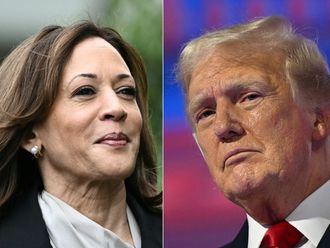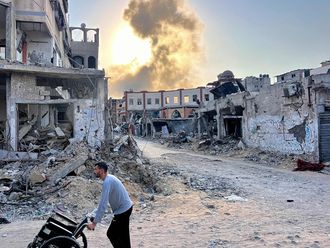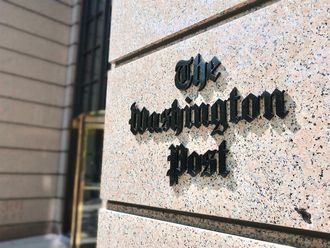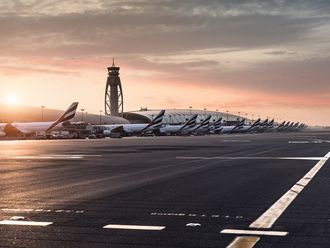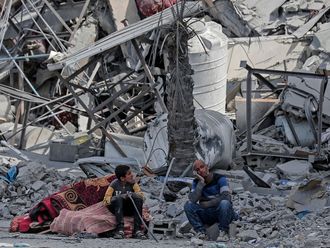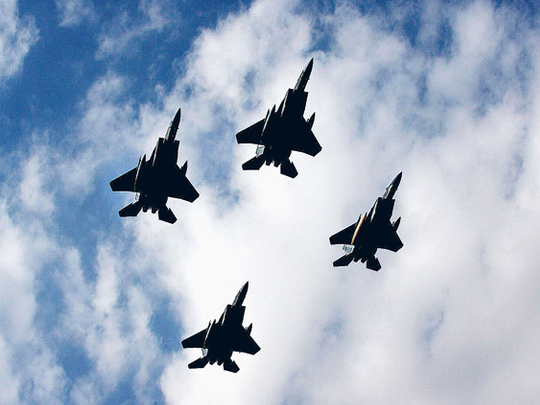
As it prepares to withdraw "fully" from Iraq, the US seems to be concerned about its security posture in the Gulf and the Middle East at large. Amidst mounting domestic pressure to limit its direct military involvement worldwide, and particularly in the Middle East, the Obama administration will be trying to re-establish the regional balance of power, which has been disrupted by the removal of Iran's two key rivals — the Taliban and Saddam Hussain.
Over the past seven months, since Iraq's general elections, the US has been exerting tremendous efforts to put a loyal government in Baghdad in place to counteract Iran's rising influence. Yet, regardless of the outcome of the effort to forge a new government in Iraq, it will not become a major regional military power again for at least a decade. If the US is to have any major strategic partner in the Gulf, it is going to be Saudi Arabia.
Last month, the Pentagon announced the largest arms sale so far to Saudi Arabia. The details of the deal have not yet been fully disclosed, but it is clear that its value is well in excess of $50 billion.
According to press reports from several sources, the sale will include 84 F-15 combat aircraft, virtually ensuring Saudi air superiority in the entire Gulf region for the next decade. The radar equipment on these aircraft is believed to give the Saudi Air Force far more capability to deal with both conventional and asymmetric warfare.
The deal also includes up to 60 Longbow Apache attack helicopters that can be used to deal with threats in areas like the Yemeni border, defend coastal and offshore targets, and counter internal threats from violent groups such as Al Qaida.
In addition, Saudi Arabia will get a mix of new patrol ships like the Littoral Combat Ship and other naval weapons that will help defend Saudi coastal waters and offshore facilities.
In making the announcement, the US was trying to depict Iran as the major threat to Saudi Arabia's national security, but has other objectives in mind. The Obama administration believes that the new arms sales will help secure the flow of energy exports to the global economy and help limit oil prices.
They are also intended to reinforce deterrence against potential regional competitors and help reduce the size of the force the US must deploy or be ready to project into the region.
Further, they will help ensure the US strategic position in the region at time when other powers like China are becoming key players in global energy, and when recycling ‘petrodollars' is becoming even more important than in the past.
The arms deal is also meant to assure Riyadh that any rapprochement between Washington and Tehran will not affect the long-standing US commitment towards Saudi Arabia's national security.
From a historical point of view, the Saudis know that the US has always had the desire to reach a compromise with the Iran government. Under the Obama administration they must have more reasons to be concerned about a possible US-Iran thaw.
In case of a military confrontation in the Gulf, however, the massive arms deal is meant to suggest that the oil-producing Arab country will have the full support of the US. This in fact has become a major trend in US-Saudi relations — whenever a compromise or a confrontation with Iran looms in the horizon, the US would announce a major arms deal with Saudi Arabia.
In 2007, for example, the US announced a $20 billion (Dh73.4 billion) arms deal, providing Riyadh for the first time with offensive weapons such as satellite-guided bombs, missiles and new naval vessels. The purpose of the deal, US officials stated at the time, was to serve as deterrence to Iran's rising power in the Gulf and throughout the Middle East.
The latest arms deal shows also that the Americans are keen not to repeat their 1979 mistake with the Saudis. During the Iranian revolution, the US tried to assure its Saudi allies that it was committed to backing them against any internal or external threats. It, hence, dispatched several military units to the Gulf.
The Saudis discovered, however, that the F15 fighter planes dispatched by the Carter administration to bolster their security after the fall of the Shah were in fact unarmed.
This incident alarmed the Saudis who grew wary about Washington's reliability to protect them in times of need.
Given the current state of the regional balance of power, the Obama administration is unlikely to allow any misunderstanding with their single most important oil producer ally.
The pro-Israel lobby will not be also allowed to block the arms deal in Congress. US-Saudi relations are passing through a sensitive stage wherein each of the two allies is testing the loyalty of the other.
Dr Marwan Al Kabalan is the director of the Damascus Centre for Political and Economic Studies.


